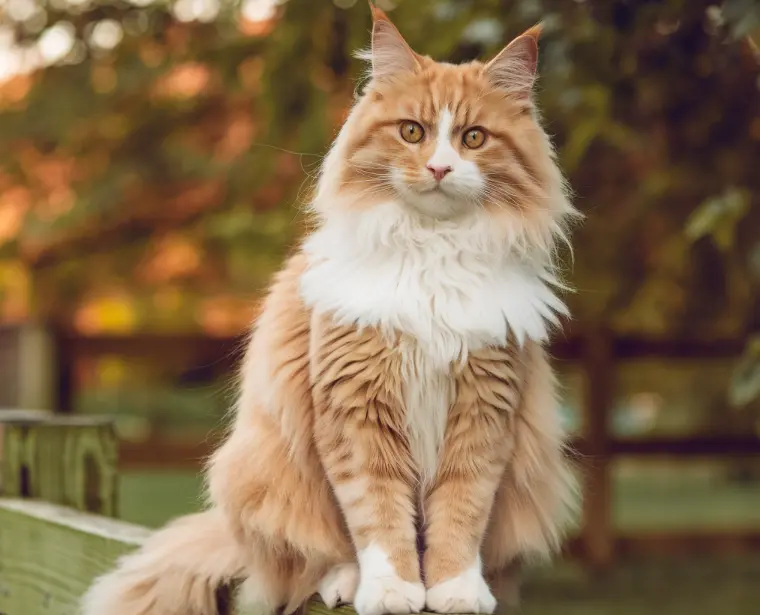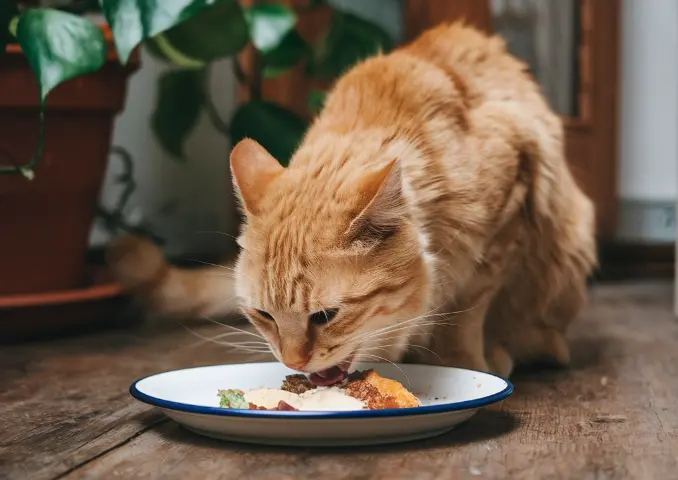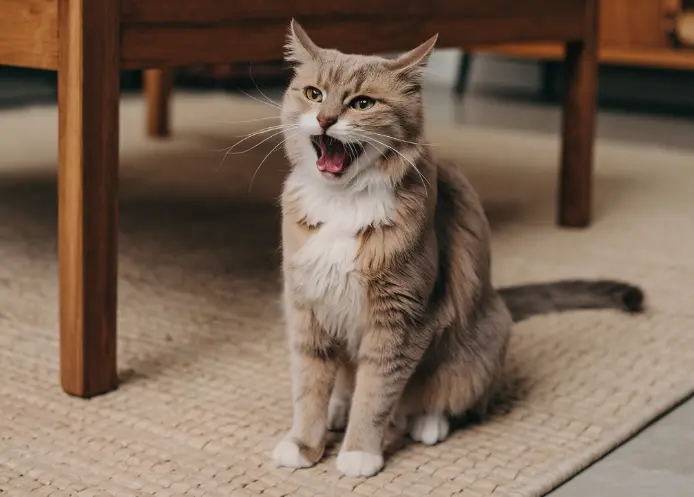Ever filled your cat’s bowl, only to be serenaded by a chorus of meows moments later? You’re not alone. This peculiar behavior leaves many cat owners scratching their heads, wondering, “Why does my cat meow after eating?” It’s a common question that deserves a closer look. Let’s dive into the world of feline communication for cat meow after eating and uncover the secrets behind your cat’s post-dinner concert.
Decoding Your Cat’s Post-Meal Meows
Before we jump into the specific reasons for after-dinner meowing, it’s crucial to understand cat communication basics. Cats are complex creatures with a wide range of vocalizations, each serving a different purpose. While purrs and chirps have their place, meows are primarily used to communicate with humans.
When your cat meows after eating, it’s important to consider the context. Is this a new behavior, or has your cat always vocalized post-meal? Understanding the pattern of your cat’s meow after eating can provide valuable clues.
7 Surprising Reasons Your Cat Meows After Eating
1. They’re Saying “Thank You”
Believe it or not, your cat meow after eating might just be expressing gratitude. While cats aren’t known for their manners, some felines develop a habit of “thanking” their humans after a meal. It’s their way of acknowledging your role as provider and caretaker.
2. Your Cat Wants More Food
Sometimes, the answer is simple – your cat is still hungry. This is especially common if:
- You’ve recently changed their diet
- They’re going through a growth spurt
- Their nutritional needs have changed due to age or health
If your cat meow after eating persistently, it might be worth reviewing their portion sizes with your vet.
3. They’re Experiencing Digestive Discomfort
Post-meal meowing could indicate digestive issues. Cats may vocalize if they’re feeling bloated, gassy, or experiencing reflux. If your cat meow after eating and shows signs of discomfort, it’s time for a vet check-up.
4. Your Cat is Seeking Attention
Cats are clever creatures. If they’ve learned that meowing after meals gets your attention, they’ll keep doing it. This behavior often stems from:
- Associating mealtime with bonding
- Wanting playtime or cuddles
- Feeling anxious when left alone after eating
To address this, try engaging your cat in a short play session after meals, or provide a puzzle toy to keep them occupied. This might reduce the frequency of your cat meow after eating.
5. They’re Alerting You to Something
Your cat meow after eating might be trying to tell you something important. Cats are naturally observant and may notice things we miss. Post-meal meowing could be their way of alerting you to:
- An empty water bowl
- A dirty litter box
- An unusual sound or smell in the house
6. It’s Become a Habit
Cats are creatures of routine. If post-meal meowing has become a habit, breaking it can be challenging. This behavior might have started for a valid reason, but now it’s just part of their mealtime ritual. Consistency is key when trying to modify your cat meow after eating habit.
7. Medical Issues to Consider
Sometimes, excessive meowing after eating can signal underlying health issues. Two conditions to be aware of are:
Hyperthyroidism: This common condition in older cats can cause increased appetite and vocalization.
Diabetes: Diabetic cats may feel hungry even after eating, leading to more meowing.
If your cat meow after eating more frequently or intensely than usual, it’s worth discussing with your vet.
Red Flags: When Post-Meal Meowing Might Signal a Problem
While some after-dinner meowing is normal, certain signs should prompt a vet visit:
- Sudden increase in frequency or volume of meowing
- Meowing accompanied by signs of pain (hunching, hiding)
- Changes in appetite or water consumption
- Weight loss despite normal or increased food intake
- Vomiting or diarrhea
Trust your instincts. You know your cat best, and if something feels off about your cat meow after eating, it’s always better to err on the side of caution.
Quieting the Chorus: How to Address Your Cat’s After-Dinner Meows
If your cat meow after eating is becoming a nuisance, try these strategies:
- Adjust feeding routines: Smaller, more frequent meals might help.
- Provide enrichment: Offer puzzle feeders or hide small portions of food around the house.
- Increase playtime: A tired cat is less likely to meow for attention.
- Create a calm eating environment: Minimize stress and distractions during mealtimes.
- Consider wet food: Some cats find it more satisfying than dry kibble.
Remember, consistency is key when modifying behavior. Give any new approach at least a few weeks before deciding if it’s effective in reducing your cat meow after eating.
Every Cat is Different: Tailoring Solutions to Your Feline Friend
Just like humans, every cat has a unique personality. What works for one might not work for another. Factors that can influence your cat meow after eating include:
- Age
- Breed
- Past experiences (especially for rescue cats)
- Health status
- Environmental factors
Take time to observe your cat’s overall behavior, not just their mealtime habits. This holistic approach will help you better understand and address their needs, including why they meow after eating.
Wrapping Up: Understanding Your Cat’s Mealtime Meows
Deciphering your cat meow after eating can feel like solving a feline mystery. But with patience, observation, and a little detective work, you can usually get to the bottom of it. Remember, meowing after eating isn’t always a problem – sometimes it’s just your cat’s way of communicating with their favorite human.
Keep these key points in mind:
- Observe patterns: Note when the meowing occurs and any accompanying behaviors.
- Rule out health issues: Consult your vet if you’re concerned or notice sudden changes.
- Be patient: Behavior modification takes time and consistency.
- Cherish the bond: Even if it’s a bit noisy, mealtime is a special opportunity to connect with your feline friend.
Understanding why your cat meow after eating is just one piece of the complex and rewarding puzzle of cat ownership. By paying attention to these post-meal vocalizations, you’re strengthening your bond and ensuring your cat’s needs are met.
So, the next time your cat meow after eating, take a moment to listen. You might just learn something new about your furry companion.
Frequently Asked Questions (FAQs):
Q: Can certain cat breeds be more prone to meowing after eating?
A: Yes, some breeds like Siamese and Oriental cats are naturally more vocal. These breeds may be more likely to meow after meals as part of their general chattiness.
Q: Is it normal for kittens to meow more after eating than adult cats?
A: Kittens often meow more frequently in general, including after meals. This is usually due to their higher energy levels and need for attention, and typically decreases as they mature.
Q: Could my cat’s after-meal meowing be related to whisker fatigue?
A: Possibly. Whisker fatigue from eating out of deep, narrow bowls can cause discomfort. Try using a wide, shallow dish to see if it reduces post-meal meowing.
Q: Can changes in my daily routine affect my cat’s post-meal vocalizations?
A: Absolutely. Cats are sensitive to routine changes. If you’ve altered your schedule, your cat might meow more after eating to regain your attention or express anxiety.
Q: Is it possible that my cat meows after eating due to a food allergy?
A: Yes, food allergies can cause discomfort, leading to increased vocalization after meals. If you suspect an allergy, consult your vet about trying a hypoallergenic diet.
Conclusion: Decoding Your Cat’s After-Dinner Dialogue
Understanding why your cat meow after eating is more than just solving a noisy nuisance—it’s about deepening your bond with your feline friend. Throughout this article, we’ve explored various reasons behind this common behavior, from simple gratitude to potential health concerns.
Let’s recap the key takeaways:
- Multiple Meanings: Your cat’s post-meal meows could signify anything from a “thank you” to a cry for attention or even a sign of discomfort.
- Observation is Key: Pay close attention to the context, frequency, and any accompanying behaviors when your cat meows after eating.
- Health Considerations: While often harmless, persistent or sudden changes in post-meal vocalizations could indicate underlying health issues.
- Tailored Solutions: Every cat is unique, so finding the right approach to manage excessive meowing may require some trial and error.
- Patience and Consistency: Whether you’re trying to modify behavior or rule out concerns, give your strategies time to work.
Remember, your cat’s meows are their way of communicating with you. By taking the time to understand why your cat meow after eating, you’re not just addressing a behavior—you’re strengthening your relationship and ensuring your cat’s well-being.
So, the next time you hear that familiar post-dinner serenade, approach it with curiosity and compassion. Your attentiveness could make all the difference in your cat’s health and happiness. After all, in the complex language of cat-human communication, even a simple meow after a meal can speak volumes.

Freya Lily has been a passionate blog writer since 2010, crafting content that captivates and informs her readers across a variety of topics. With over a decade of experience, Freya has honed her skills in delivering insightful and engaging narratives that resonate with her audience. Her dedication to quality writing and her ability to adapt to evolving trends have established her as a notable voice in the blogging community, where her work continues to inspire and engage readers.


